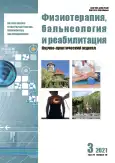Lichen sclerosus et atrophicans in men: clinical efficacy of hydrobiont collagenase isoenzymes electrophoresis in the rehabilitation phase
- 作者: Ignatovskiy A.V.1, Zhelonkin A.R.1, Zhelonkina A.O.1
-
隶属关系:
- Saint-Petersburg State University
- 期: 卷 20, 编号 3 (2021)
- 页面: 247-252
- 栏目: Original studies
- URL: https://bakhtiniada.ru/1681-3456/article/view/106158
- DOI: https://doi.org/10.17816/1681-3456-2021-20-247-252
- ID: 106158
如何引用文章
详细
BACKGROUND: In view of the lacking ineffectiveness of the currently established treatment methods of men with genital lichen sclerosus (GLS), as well as the lack of evidence-based ways of managing patients at the rehabilitation stage, there exists a want for new approaches to solve this problem.
AIMS: The aim of the research was to study the possibility of applying electrophoresis of an enzyme preparation from hydrobiont collagenases at the stage of rehabilitation in men with GLS.
MATERIAL AND METHODS: Open-label randomized controlled trial comparing clinical efficacy of hydrobiont enzyme preparation and standard supportive emollient therapy at the stage of rehabilitation in men with confirmed GLS was conducted. The follow-up period lasted for 16 weeks. Clinical efficacy was estimated using specifically developed scores LS-S (surface area), LS-A (disease activity) and validated dermatologic life quality index (DLQI) at 6th and 16th week of follow-up. The primary study outcome was the comparative efficacy at 16th week as based on the evaluated scores.
RESULTS: All patients (n=27) were given topical glucocorticoids (TGCs) at the first stage of the study during the first 6 weeks. The patients were then randomly allocated into 2 groups for the rehabilitation stage that lasted from 6th to 16th week of the study. The first group (primary group, n=13) were managed with electrophoresis of an enzyme preparation from hydrobiont collagenases. The second group (control group, n=14) were managed with emollients at the rehab stage. The age of patients in the first group and in the second group was 36,62±16,04 and 41,93±9,34 years, respectively. At baseline before initiating treatment patients in both groups as judged by LS-S (p=0,110), LS-A (p=0,757) и DLQI (p=0,149) comparable. At 6th week after course of TGCs no statistically significant differences were detected. At the primary study outcome at 16th week scores LS-S (p=0,002), LS-A (р <0,001) and DLQI (р <0,001) evidenced significantly in favour of enzyme electrophoresis.
CONCLUSION: During staged treatment, a more pronounced and long-lasting effect was observed in the group of patients with electrophoresis of the enzyme complex during the rehabilitation stage compared to the group with emollients
作者简介
Andrei Ignatovskiy
Saint-Petersburg State University
编辑信件的主要联系方式.
Email: derm@list.ru
ORCID iD: 0000-0003-3048-2488
SPIN 代码: 8500-0451
MD, Cand. Sci. (Med.), Associated Professor
俄罗斯联邦, Saint-PetersburgAnton Zhelonkin
Saint-Petersburg State University
Email: derm@list.ru
ORCID iD: 0000-0001-9013-3197
SPIN 代码: 3507-5623
MD
俄罗斯联邦, Saint-PetersburgAngelina Zhelonkina
Saint-Petersburg State University
Email: derm@list.ru
ORCID iD: 0000-0002-8007-8945
MD
俄罗斯联邦, Saint-Petersburg参考
- Kizer WS, Prarie T, Morey AF. Balanitis xerotica obliterans: epidemiologic distribution in an equal access health care system. South Med J. 2003;96(1):9–11. doi: 10.1097/00007611-200301000-00004
- Pugliese JM, Morey AF, Peterson AC. Lichen sclerosus: review of literature and current recommendations for management. J Urol. 2007;178(6):2268–2276. doi: 10.1016/j.juro.2007.08.024
- Nasca MR, Innocenzi D, Micali G. Penile cancer among patients with genital lichen sclerosus. J Am Acad Dermatol. 1999;41(6):911–914. doi: 10.1016/s0190-9622(99)70245-8
- Edmonds EV, Hunt S, Hawkins D, et al. Clinical parameters in male genital lichen sclerosus: a case series of 329 patients. J Eur Acad Dermatol Venereol. 2012;26(6):730–737. doi: 10.1111/j.1468-3083.2011.04155.x
- Lewis FM, Tatnall FM, Velangi SS. British Assotiations of Dermatologists guidelines for the management of lichen sclerosus, 2018. Br J Dermatol. 2018;178(4):839–853. doi: 10.1111/bjd.16241
- Sokolova AA, Zatorskaya NF, Medvedeva OV, et al. Modern approaches to therapy and management of men with genital sclerotrophic lichen. Clin Dermatol Venereol. 2017;16(1):70–73. (In Russ). doi: 10.17116/klinderma201716370-74
- Karpova TN. Fermenkol ultraphonophoresis in the correction and prevention of scars. Physiotherapist. 2009;4:38–39. (In Russ).
- Karpova TN, Matytsin VO. Evaluation of the effectiveness of the use of Fermenkol for the prevention and correction of scars. Physiotherapist. 2008;6:53–54. (In Russ).
- Kondratieva YS, Filinova SO. Enzyme preparations in the therapy of sclerotrophic lichen of the external genitalia in women. Bulletin Med Sci. 2017;4(8):56–60. (In Russ). doi: 10.31684/2541-8475.2017.4(8).56-60
补充文件









